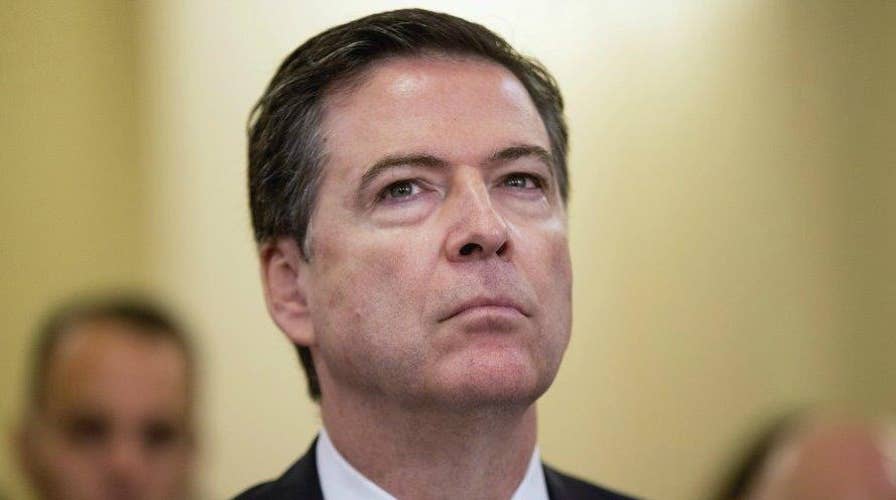How revealing are Comey's prepared remarks on Trump?
'The Fox News Specialists' break down former FBI director's statement to Senate Intelligence Committee
So after all this time, what the Comey testimony comes down do is the president’s request for “honest loyalty.” I can’t get very upset about that. That’s not the same thing as a request for dishonest loyalty, which by definition is criminal. Importantly, it’s not the same thing as “honest disloyalty.”
There’s a lot of honest disloyalty in Washington, with all the leaking that’s going on. The State Department staffers who rush from a meeting with Trump to phone the Washington Post might report honestly on what was said, but they’re disloyal all the same. Then there are decisions that come down to judgment calls, where an official has some discretion about what to do. If he’s a partisan Trump hater, the decision will come out differently than it would from a Trump loyalist. And everybody knows this.
The members of an administration charged with enforcing the law—the Attorney General, the FBI Director—hold their offices in a dual capacity. They’re officers of the law, and they’re members of the administration and dismissible by the president. If I had to summarize in two words how they could honorably satisfy the joint duties of their offices, I couldn’t do much better than “honest loyalty.”
Loyalty was especially needed, given the fake news that was surrounding the administration and interfering with its policy objectives. The Russian reset, which every administration has sought since the fall of communism, was on hold until the falsehoods could be knocked down. And remember just how salacious those stories were, and how eagerly a partisan press hallooed them.
These stories, incidentally, were alluded to in the statement Comey released Wednesday, thereby ensuring that they’d be all over the press Thursday, the day of his testimony. Even if you assume that Comey has a duty to testify before Congress, that couldn’t conceivably include the need to mention such stories. Unless it was payback time for Comey. But even as a private citizen, Comey retains some duties to the president who appointed him, and in this respect his testimony is the very definition of honest disloyalty.
If you read Comey’s testimony carefully, with some insight into how a normal person in Trump’s shoes might have regarded the FBI Director, you’ll see just how painful the interview might have been. Even without Comey’s strange history – the sad story of his interventions in the 2016 campaign, his seeming eagerness to hog the limelight – it’s easy to imagine the FBI Director’s uncomfortable visual cues. Have you ever had the sense, when meeting with someone, that he wanted to rush away and transcribe everything you just said, to be leaked publicly at a future date? That’s how it very plausibly must have seemed to Trump. Not without reason, I expect that he was simply creeped out by Comey.
We’ll hear a lot about Comey’s feelings Thursday. I expect he’ll say he felt pressured to drop the investigation of General Flynn. But with a person who so much resembles an emotional basket case as Comey, his feelings aren’t all that important. Instead, what matters is whether a reasonable person would reasonably have felt pressured. And the evidence just doesn’t seem to be there. Or anywhere close.
For that, we have the evidence of James Comey himself. A month ago, he told the Senate Judiciary Committee, “I'm talking about a situation where we were told to stop something for a political reason, that would be a very big deal. It's not happened in my experience.” The Russian investigation went on, and even after Comey was fired, Acting FBI Director Andrew McCabe (a Comey loyalist) testified that there was no interference in the FBI’s Russia investigation.
Finally, is it just possible that Flynn deserves to be cleared? I have some problems with his ties to Erdogan’s Turkey, but that’s another matter. As for Russia, all we’ve seen is a report of a transcript with a Russian ambassador that sounded pretty innocuous to everyone who wasn’t a member of an anti-Trump lynch mob.
The discussion about “honest loyalty” was prompted by Comey himself. “I’m not ‘reliable’ in the sense that politicians use that word,” he told Trump. But he’d always tell Trump the truth, he added. He didn’t need to go there. If anything became clear during the 2016 campaign, when Comey first absolved Hillary Clinton, then rapped her knuckles, then reopened the investigation, then closed it two days before the election, we learned that “reliable” wasn’t Comey’s middle name. Which was a pretty good reason to fire him.

